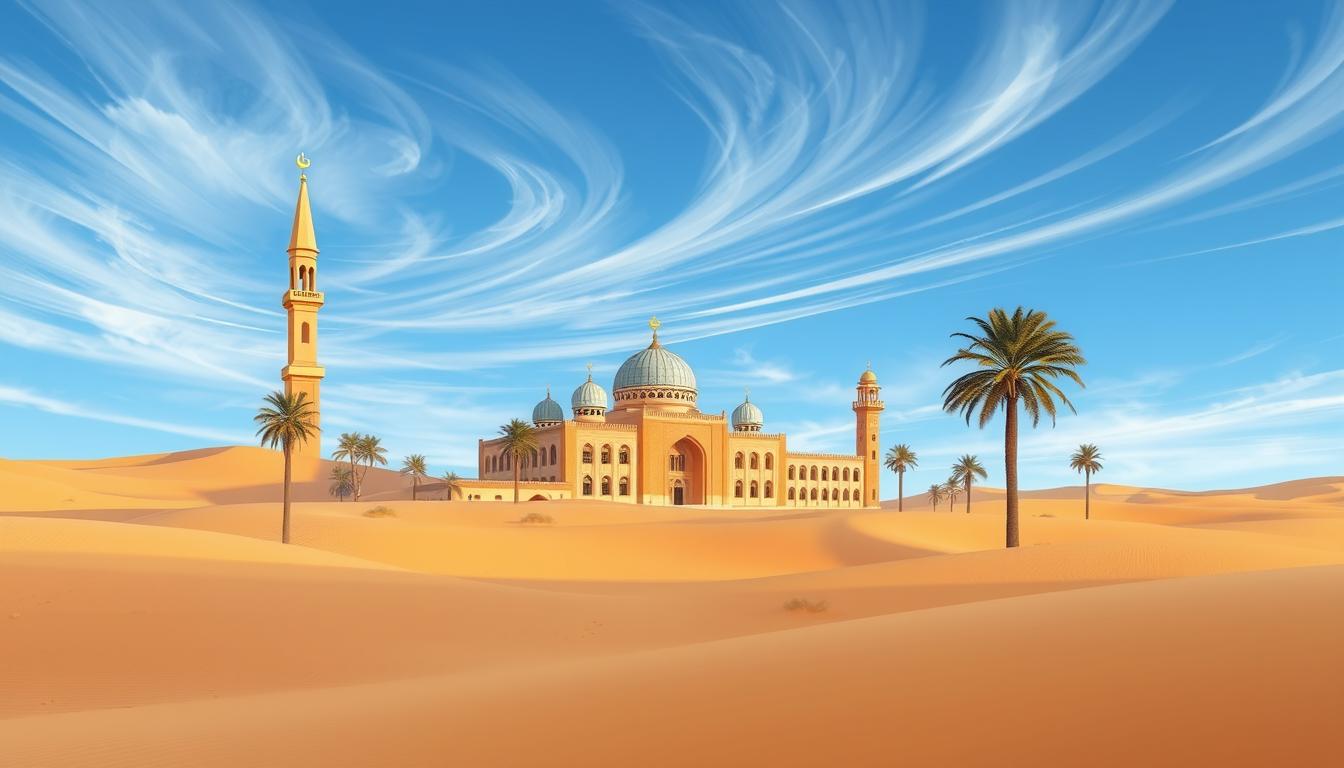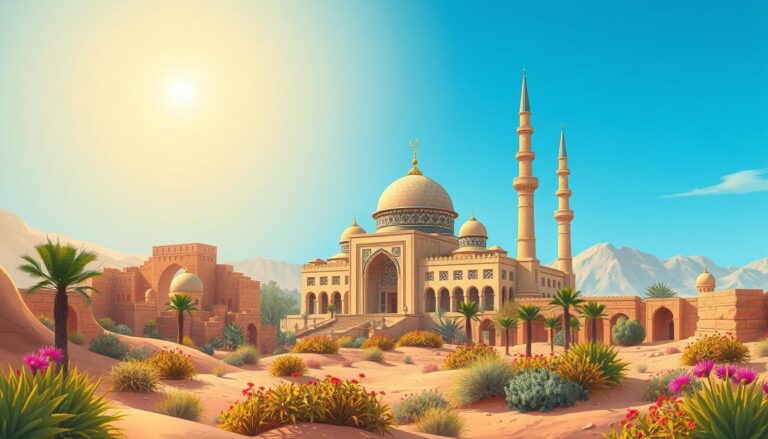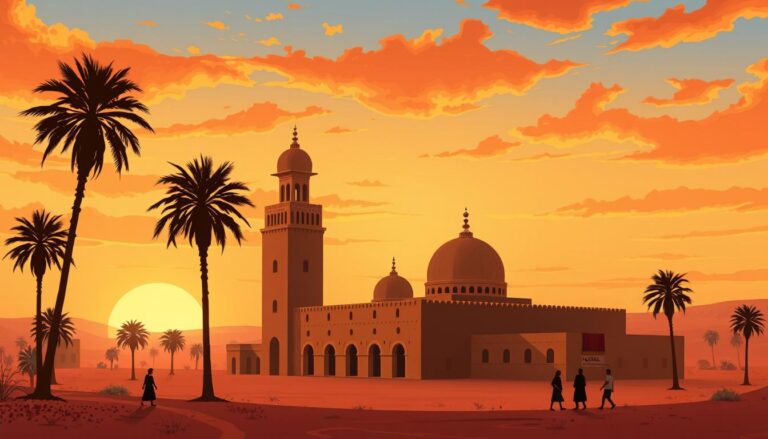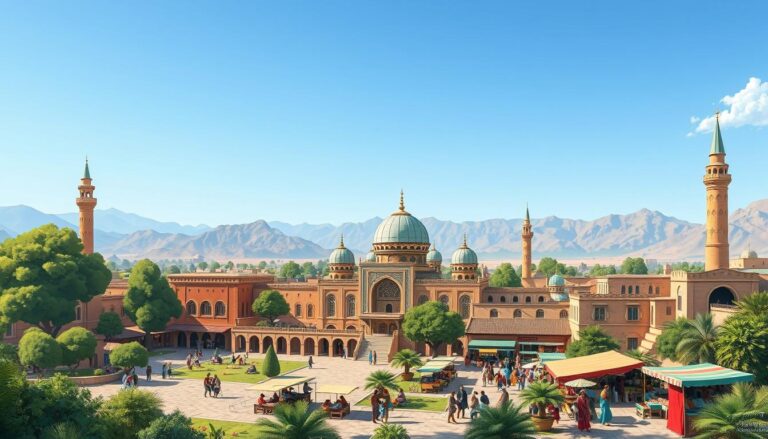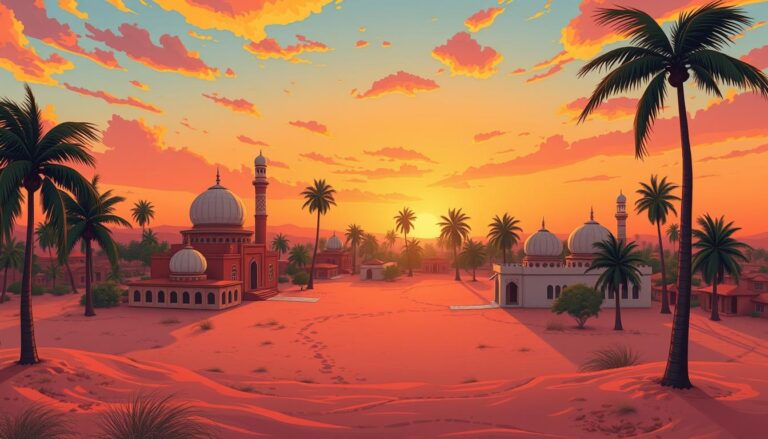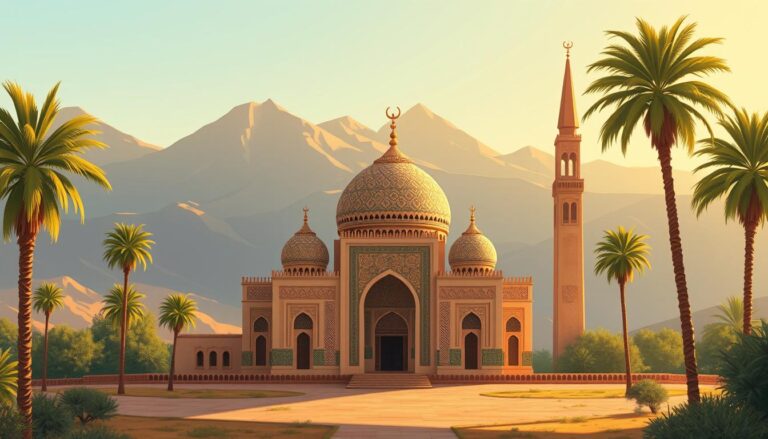Islam in Mauritania
In Mauritania, Islam is a big part of people’s lives. About 99% of the population is Sunni Muslim. The country is an Islamic republic, with Islam as the state religion and sharia law since 1960.
The Maliki school of Sunni jurisprudence shapes the country’s culture and traditions. This school has a big impact on the Moorish culture and Arabic-speaking ways.
Sufi Islam is also important in Mauritania. The Tijaniyyah and Qadiriyyah orders are the biggest Sufi groups here. The country’s scholars are known for their focus on memorization and writing.
This has greatly influenced the culture, politics, and society of the area.
History of Islam in Mauritania
The history of Islam in Mauritania began when the Umayyad Arabs arrived in the late 7th century. Their conquest introduced Islam to the area. But, many Berber tribes fled to Mali’s Gao region to avoid the Arabs.
In the 19th century, Sufi brotherhoods like the Qadiriyyah and Tijaniyyah became influential in Mauritania. These groups helped spread religious identities, moving beyond traditional family ties.
Arrival of Islam
The Umayyad Arabs brought Islam to Mauritania in the late 7th century. Many Berber tribes moved to Mali’s Gao region to escape them. It wasn’t until the 19th century that Sufi brotherhoods like the Qadiriyyah and Tijaniyyah gained power. They used religion to expand identities and loyalties.
“The Umayyads were the first Arab Muslims to enter Mauritania, with their presence in the region dating back to the end of the 7th century.”
In the 1980s, the Qadiriyyah and Tijaniyyah brotherhoods were key in Mauritania. They differed mainly in their prayer methods but shared Islamic beliefs. These Sufi orders greatly shaped Mauritania’s religious scene.
Sufi Brotherhoods in Mauritania
Mauritania is rich in Islamic traditions, thanks to Sufi brotherhoods, or tariqas. The Qadiriyyah and Tijaniyyah orders are the most influential, attracting nearly all followers since the 1980s. These tariqas may vary in their rituals but share the same Islamic beliefs.
Smaller but significant brotherhoods, the Shadhiliyyah and Goudfiya, also exist in Mauritania. These Sufi orders are key in shaping the country’s religious scene. They help build community and offer spiritual guidance.
The Tijaniyyah Order
The Tijaniyyah order, started by Ahmad al-Tijani, has grown a lot in Mauritania. The Zaouïa in Medina 3, Nouakchott, was founded 40 years ago. It now has hundreds to thousands of followers, including young people for Quranic studies.
The Tijaniyyah’s influence goes beyond Mauritania. Mauritanian Sheikhs visit Nigeria and South Africa, and vice versa. This shows their strong connections and outreach.
The Tijaniyyah fights against fundamentalist groups, facing criticism from Wahhabi Muslims and Salafi activists. Yet, they continue to hold religious events, drawing many followers. This shows their strength and ability to connect with others.
“My vision of the world changed after converting to Islam in June 2001. I developed a new sense of respect for others.”
– A 32-year-old South African convert to the Tijaniyyah order
Islam as the State Religion
Since Mauritania gained independence in 1960, Islam has been its state religion. Sharia law is the land’s law. The Constitutional Charter of 1985 made Mauritania an Islamic republic.
All Mauritanians must be Muslim. The country has a single legislative body. Blasphemy laws in Mauritania were made stricter in 2017. Now, anyone insulting Allah can face the death penalty, even if they apologize.
Mauritania works closely with Western nations against terrorism. It’s part of the G5 Sahel group and has worked with NATO since 1995. At the last NATO summit in Madrid, Mauritania was named a “privileged partner.”
Although Mauritania was once close to Israel, it cut ties in 2009. This move might change its relations with the Middle East and North Africa.
In Mauritania, Islam is mainly practiced as Mālikī Sunni Islam, Ashʿarī theology, and Sufism. Islamic teachings have shaped Mauritanian politics for over a thousand years. The Sharia law Mauritania plays a big role in the country’s laws.
Legal Framework and Islamic Laws
Mauritania’s legal system combines French civil law and Sharia, the Islamic legal framework. The Islamic legal framework Mauritania greatly influences the country’s laws. Sharia’s principles are deeply woven into the legal code.
The country strictly prohibits apostasy and blasphemy. The law calls for death for those found guilty. This shows Mauritania’s strong commitment to the Sharia-based criminal code Mauritania.
For adultery and homosexuality laws Mauritania, the penalties are severe. Offenders face 100 lashes or imprisonment. The worst punishment is death by stoning.
“Mauritania’s legal system is a unique blend of French civil law and the principles of Sharia, the Islamic legal framework.”
Even though these harsh penalties are rarely used today, their presence is significant. It shows the big role of Islamic laws Mauritania in the legal system. The government’s use of Sharia principles shows Islam’s strong influence in Mauritanian society.
Adding Sharia law to Mauritania’s legal system has been a complex journey. There are debates about how directly Sharia should be applied in courts. Yet, the Sharia-based criminal code Mauritania is a key part of the legal framework. It shapes how the country handles social and moral issues.
Religious Demography
Mauritania is mostly Islamic, with Sunni Muslims being the majority. Government figures say Sunni Muslims are about 99% of the population. But some unofficial sources think it’s a bit lower, around 98%.
Shia Muslims are a small minority, making up about 1% of the population. The rest, about 1%, are non-Muslims, mostly Christians and a few Jews. These non-Muslims are mostly not citizens, and most citizens follow Islam.
- Sunni Muslims: 98-99%
- Shia Muslims: 1%
- Non-Muslim minorities (mostly Christians and Jews): 1%
Mauritania is officially secular but Islam greatly influences its laws and society. The government controls religious activities closely. It also bans spreading non-Islamic faiths. This strict rule has raised concerns about religious freedom and minority rights.
“Mauritania is a deeply religious society, where Islam is not just a personal belief but a way of life that permeates all aspects of society.”
The religious makeup of Mauritania shows its strong Islamic identity. Sunni Muslims make up almost all the population. The presence of Shia Muslims and non-Muslims shows the challenges they face in a society deeply rooted in Islamic orthodoxy.
Islam in Mauritania
Islam is a big part of life in Mauritania. It shapes how people live and celebrate. The country loves to celebrate Ramadan and other Islamic festivals.
The government supports these celebrations by running a Quranic TV and radio. They focus on teaching moderation in Islam in Mauritania.
In Mauritania, Islamic practices are a big part of who they are. Islam is seen in daily life and big celebrations. During Ramadan, families come together to break their fast and pray.
Islam also shows in the country’s culture. Islamic art, architecture, and literature are highly valued. These show the strong link between faith and tradition.
Mauritania’s Islamic festivals also show how important religion is. They highlight the nation’s identity.
“Islam is not just a religion, but a way of life in Mauritania. It affects everything, from how we dress to our traditions.”
The government works hard to spread Islamic values. Their TV and radio stations share messages of moderation. This helps people understand Islam in Mauritania better.
In Mauritania, Islam is more than a religion. It’s a way of life that touches every part of their culture and identity. From daily rituals to big celebrations, Islam’s impact is clear and loved by all.
Regulation of Religious Groups
In Mauritania, Muslim religious groups don’t need to register. But, non-Muslim groups can register by applying to the Ministry of Interior and the Ministry of Islamic Affairs. Yet, no non-Muslim groups have registered so far.
Registration of Non-Muslim Groups
The law for NGOs in Mauritania changed in 2021. It now makes it easier for faith-based groups to register. But, they must promise not to spread any religion except Islam.
The Regulation of religious groups Mauritania and the Registration of non-Muslim groups Mauritania show the government’s focus on Islam. The NGO law Mauritania also restricts Proselytizing restrictions Mauritania to Islam only.
“The government does not register Muslim religious groups, but the law allows for non-Muslim religious groups to register and operate by applying through the Ministry of Interior and the Ministry of Islamic Affairs and Traditional Education.”
Even with the law, no non-Muslim groups have registered in Mauritania. This shows the government’s strong stance on Islam. It makes registering hard or discourages it.
Islamic Education and Instruction
Mauritania is proud of its Islamic heritage. Its education system shows this pride. Students in public and private schools get four hours of Islamic studies each week. These classes are taught in Arabic.
For those aiming for the baccalaureate degree, religious studies are key. The government also runs a Quranic TV channel and radio. They focus on teaching moderation and balance in Islam.
- Most Mauritanian kids memorize the Quran by age 6 or 7.
- Daily Quran lessons with a Sheik last 5-10 minutes. Students often memorize the lesson first.
- Some Mauritanian scholars have memorized entire books of Hadith, like Sahih Muslim and Sahih al-Bukhari.
The country’s dedication to Islamic education Mauritania and Quranic education Mauritania goes beyond schools. Places like Dar Us Salaam offer free Islamic education, clothes, food, and shelter to many students. This helps keep the nation’s religious heritage alive.
“Mauritania is known as a land rich in Islamic heritage, with continuous recitation of the Quran day and night.”
Mauritania combines mandatory Islamic instruction in schools Mauritania with community efforts. This ensures its people stay connected to Islam’s teachings. It protects a vital part of the nation’s identity.
Challenges to Religious Freedom
Mauritania’s laws are strict, banning apostasy and blasphemy. The criminal code calls for death for those found guilty. In 2022, a man was detained briefly after his son brought Bibles and Christian materials from Senegal. The authorities wanted to charge him with “tartuffery” but later released him.
The government has never carried out the death penalty for these crimes. Yet, these laws still hinder religious freedom in Mauritania.
Apostasy and Blasphemy Laws
In 2018, Mauritania updated its penal code to include the death penalty for Muslims who commit apostasy or blasphemy. This move has raised concerns among human rights advocates. They have spoken out at the UN General Assembly, pushing for laws that prevent capital punishment for non-violent crimes.
Even though the death penalty is rarely applied, these laws create fear. This fear affects religious minorities and those who question the official Islamic doctrine. The Mauritanian constitution promises Freedom of Expression in Article 10, but the government limits this to only Islam.
- Mauritania was ranked 23rd on Open Doors USA’s list of countries where Christians are most persecuted in 2022.
- 11 out of 57 members of the Organization of Islamic Cooperation have the death penalty for blasphemy, including Mauritania.
- In Mauritania, non-Islamic religious services are open only to foreigners, restricting citizens’ access to such services.
The government uses strict laws to silence critics. This includes a new law on fighting information manipulation. These actions make religious freedom in Mauritania even harder to achieve.
Government Efforts and International Engagement
The Mauritanian government is working hard to promote religious tolerance. They are teaming up with the U.S. Embassy and the Ministry of Islamic Affairs. Together, they are running programs to help religious scholars understand each other better.
The U.S. Ambassador for International Religious Freedom is also involved. They talk with Mauritanian officials and groups to protect religious minorities. They want to change laws that punish blasphemy and apostasy, and fight against human trafficking.
Mauritania is part of the International Covenant on Civil and Political Rights. This shows they are serious about human rights and religious freedom. They also passed a new law in 2021 that makes it easier for groups to register and work in the country.
But, there are still problems with religious freedom in Mauritania. The government doesn’t let people print or share non-Islamic materials. Non-Muslims can’t preach either. Yet, there are women leaders who are changing things. They talk about tolerance, equality, and stopping violence.
The government’s work with the world and their push for tolerance are key. They help deal with the tough issues of religious freedom in Mauritania.
Conclusion
Islam is a big part of life in Mauritania. Most people follow Sunni Islam and the Maliki school of law. Sufi groups like the Qadiriyyah and Tijaniyyah also shape the country’s faith.
Even though the government tries to be open, there are still big challenges. Laws against leaving Islam or speaking out against it are strict.
Mauritania has had different kinds of leaders since it became independent in 1960. Its religious teachings come from both local and global Islamic traditions. The maḥḍara system of Islamic education is key, with efforts to make it better.
But, Islam isn’t the only faith in Mauritania. There are also Roman Catholic and Christian churches in big cities. Foreign faith-based groups are also active. Yet, the government has rules to keep things in order, like stopping mosques from being used for politics.
Source Links
- Mauritania – United States Department of State
- Religion in Mauritania
- The Importance of Mauritanian Scholars in Global Islam – MERIP
- Islam in Mauritania
- Mauritania – Islam, Animism, Sufism
- Sufism in Mauritania: another view of Islam
- Mauritania’s Precarious Stability and Islamist Undercurrent
- The Forgotten Islamic Republic: Mauritania’s Importance in the World — International Relations Review
- No title found
- Mauritania
- Law and Legal Systems in Mauritania
- Researching the Legal System and Laws of the Islamic Republic of Mauritania
- Freedom of religion in Mauritania
- National Profiles | World Religion
- The Mourchidates, the Mauritanian Women religious guides
- Islam in Mauritania Between Political Expansion and Globalization: Elites, Institutions, Knowledge, and Networks
- Mauritania’s Islamists
- Mauritania
- Mauritania – Freedom of Thought Report
- Studying in Mauritania
- DarUsSalaam
- The Challenge of Radical Islam in Mauritania
- Mauritania Shrugs Off Mounting Criticism of Capital Punishment Blasphemy Codes
- World Report 2021: Rights Trends in Mauritania
- Mauritania – United States Department of State
- In Mauritania, Mourchidates take the lead in preventing violent extremism in local communities
- Mauritania – United States Department of State
- No title found
- Mauritania – United States Department of State
- Mauritania

